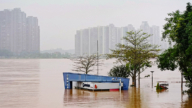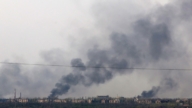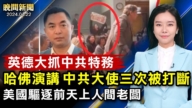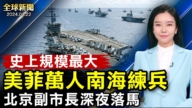【新唐人2014年05月12日讯】目前,中共和菲律宾的紧张局势还没有结束,但在南海的另一侧,中共与越南又发生了新的冲突。最近,中共船只在南海的“争议海域”,向越南巡逻船发射水炮,并多次撞击越南船只,导致越方有船员受伤。中共在南海与邻国不断发生摩擦,他们是真想打仗吗?请看以下报导。
中共海事局5月5号宣布,在未来的三个月将在西沙群岛某处,建立一座油井钻井平台。但钻井平台位置距越南海岸仅120公里,在越南宣称的“越南专属经济区”内。5月7号,中、越船只在争议海域发生了冲突。
越南外交部9号对外公布了两国船只冲撞的录影,并声称中国船只撞击越南船只、向越南船只发射水炮,有两艘越南船只严重受损,9人受伤。
越南外交部还表示,中共的此次行动,是对越南领海主权和专属经济区利益的严重挑衅。
美国《华尔街日报》引述越南官员的话说,大约80艘中国船只进入了西沙群岛附近的争议水域,其中中有7艘是军用舰艇。
美国中文杂志《中国事务》总编辑伍凡表示,中国经济现在正在下滑,中共不仅需要南海的贸易通路进出口物品,而且南海区域也储藏着巨大的石油,所以,“控制南海”是中共的现实需要。
美国中文杂志《中国事务》总编辑伍凡:“这次欧巴马4月份访问亚洲,他力挺日本和菲律宾,但是他跟越南没有军事同盟。所以,中共这次挑战,首先挑战越南,看你美国你要打算怎么做?”
伍凡指出,南海的紧张局势就是中共有意挑起来的,“紧张局势”正是中共所需要的。
伍凡:“他第一要转移国内的矛盾。非常明显,习近平从反腐打到现在不成功,那么他要强军强国来支撑他的地位,以及支撑他的政权。否则,你的政权在国内的经济搞不好,打腐败也不能赢,外国欺负你的时候你也没有任何作为,那你的政权很快就完蛋了。”
伍凡认为,与俄国越走越近的中共,也可能会效仿俄国在乌克兰的做法,所以与越南发生擦枪走火是有可能的。
而日本外相岸田文雄认为,中、越在南海对峙,是“中国单方面发起的挑衅性海洋活动的一环”,“中国应向越南及国际社会明确说明自身活动的依据”。
美国国务院也指出,中国决定将钻井平台建在有争议的水域,这“具有挑衅性,引起了紧张”。
不过,“香港城市大学”政治学教授郑宇硕认为,中国与邻国争端的升级,实际上也为欧巴马“重返亚洲”的战略,创造了有利条件。
香港城市大学政治学教授郑宇硕:“日本跟中国有钓鱼岛争端,菲律宾、越南,甚至比较倾向西方的新加坡、印尼,这些国家,他们都有意利用美国的军事力量来平行(衡)中国的军事扩张。”
不过,郑宇硕认为,从中、美经济的相互依赖的程度,以及美国人不愿意大打仗的民意来看,中、美两个大国直接出现军事冲突的可能性非常低。
5月9号的香港《东方日报》社论指出,“南海风高浪急,烽烟四起,菲律宾和越南近日遥相呼应,联手挑衅中国,北京如果继续停留在口头抗议而不敢亮剑,势必被当作纸老虎,沦为国际笑柄。”
中国国内的一些网站论坛上,对南海不断升级的领土争端反应热烈,主张武力教训越南、菲律宾的激进言论不绝于耳。
伍凡表示,中共已经在北方丢了那么多领土,如果在南海再丢掉领土,那就卖国卖到家了。伍凡指出,中国在南海的边界线是二战后由“国民党政府”划定的,当时没有任何国家反对。中共目前只不过是想按着当时“国民党政府”划定的九段线,划定领海主权而已。
采访/易如 编辑/宋风 后制/孙宁
Tensions Increase between the Chinese Communist Party
and Vietnam: Is a War Coming?
With tension between the Chinese Communist Party (CCP)
and the Philippines spiraling, new incidents occurred between
the CCP and Vietnam on the other side of the South China Sea.
Recently, CCP ships have been firing water cannons and
ramming Vietnamese vessels causing them damage.
There were also reports of injuries among Vietnamese crew.
By initiating those incidents, does the CCP seriously want to
start a war? Please look at the following report.
On May 5, the CCP’s Maritime Safety Administration (MSA)
announced it will create an oilrig around the Xisha Islands
in three months.
The planned oilrig is only 120 kilometers off Vietnam’s coast,
and located inside the “Economic Zone” claimed by Vietnam.
On May 7, clashes occurred between Chinese and Vietnamese
vessels in the disputed area.
On May 9, Vietnam’s foreign ministry showed video clips of
the clash and claimed that Chinese ships initiated the collision
against Vietnamese vessels and also fired water cannons.
Vietnam reported that two of its ships were seriously
damaged and nine people were injured.
Vietnam said, the CCP’s move had seriously violated
Vietnam’s sovereignty over its exclusive economic zone.
A Wall Street Journal report quoted Vietnamese officials that
about 80 Chinese ships entered the disputed area around the
Xisha Islands, including seven military vessels.
Wu Fan, Editor-in-Chief of China Affairs magazine, commented
that as China is facing economic slowdown, the CCP not only
needs to export its products across the South China Sea, but
also covets the huge amount of oil stored in the region.
So the CCP has a real motivation in controlling the area.
Wu Fan: ”In his visit to Asia in April, president Obama voiced
strong support to Japan and the Philippines.
However, there is no alliance between the U.S. and Vietnam.
So the CCP challenged Vietnam to see how U.S. would react.”
Wu Fan said, the CCP is intentionally raising tension in the
South China Sea; “tension” is exactly what it needs right now.
Wu Fan:”First of all the party attempts to distract Chinese
from domestic problems.
It is easy to see that Xi’s anti-corruption campaign has not
been very successful.
So he acts strongly in military and foreign affairs to
sustain his power.
Otherwise, with failures in economic development and anti-
corruption campaign, if he makes no further achievements in
foreign affairs the whole regime will collapse very soon.”
Wu Fan believes that as the CCP is going more closely to
Russia, it might copy Russia’s moves of grabbing the Crimea;
So it is not impossible that the CCP will have
military conflicts with Vietnam.
Fumio Kishida, Japanese Foreign Minister, said the clashes in
South China Sea waters were results of “CCP provocation”.
Beijing should “clarify to Vietnam and the international
community the basis of its increasing maritime activities.”
The U.S. State Department also said that the CCP’s decision
of locating the rig in disputed waters “is provocative and
will further raise regional tensions”.
Yu-shek Cheng, a politics professor at City University of Hong
Kong, said the CCP’s escalating tension with its neighbors is
also a good chance for Obama’s strategy of “Return to Asia”.
Yu-shek Cheng:”Japan has disputes with the CCP on Senkaku
Islands issues.
The Philippines, Vietnam, including Singapore and Indonesia
that are closer to the western world, are all willing to see if
U.S. military forces can balance CCP aggression in the region.”
Yu-shek Cheng also said, as China and U.S. greatly depend
on each other economically, and most American people
oppose starting another war, it is not likely that these two
powers will make direct military conflicts.
Hong Kong’s Orient Daily published editorial on May 9, saying:
“Tensions and conflicts are increasing in South China waters;
Philippines and Vietnam are collaborating in
challenging China’s sovereignty”.
“If Beijing continues to just condemn without using military
force, it will be seen as a paper tiger and end as a global joke.”
In some Chinese online forums, there have been strong
responses to the escalating territorial disputes in the South
China Sea.
Many advocate that the CCP should “give a lesson” to
Vietnam and Philippines with its navy.
Wu Fan said, with so many lands lost in the north, if the CCP
loses more in the south it will become an even worse traitor
to Chinese people.
Wu Fan further said China’s current border on South China
waters follows that regulated by the Republic of China (ROC)
after World War II.
The CCP currently is trying to claim its territory according to the
same “Nine-dotted line” presented by the ROC.
Interview/Yiru Edit/Shongfeng Post-Production/Shenlin




























